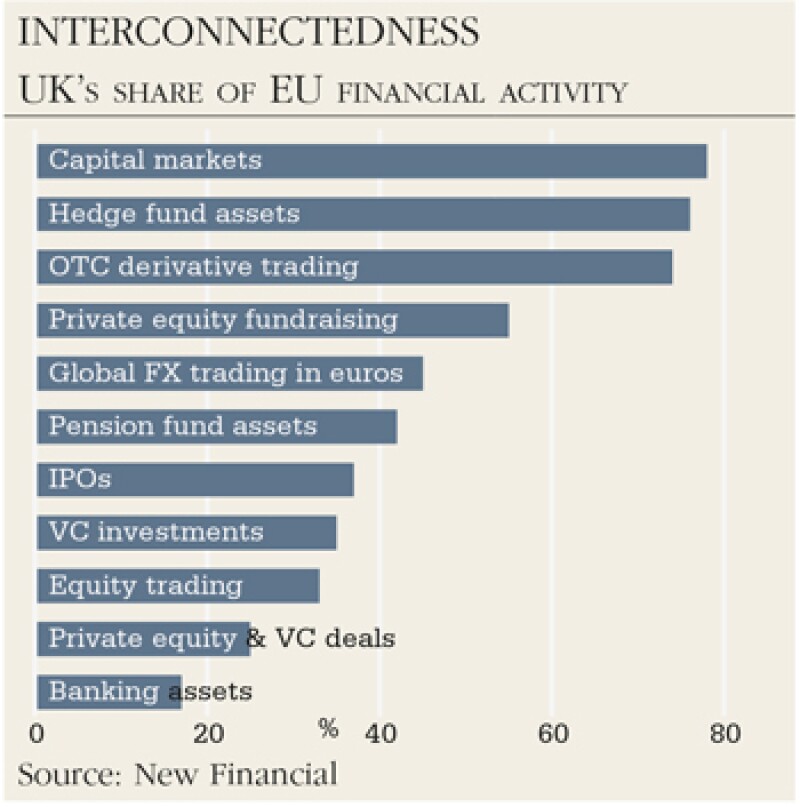The UK referendum, on June 23, on whether to remain a member of the European Union is a high-stakes gamble for the trade-deficit-ridden UK economy. It’s an even bigger gamble for the City’s status as the global hub for euro finance.
The short-term impact would be costly for financial institutions, placing a higher risk premium on UK assets across the board, given a lack of clarity about the UK’s medium- to long-term trading position, the prospect of a technical recession and a likely fall in sterling, say analysts.
UK banks’ cost of funding would be expected to rise, as would the cost of dollar funding, which, as implied by the swaps market, spiked earlier this year to 2013 euro-crisis levels on Brexit fears.
Mark Carney, Bank of England governor, has doubled down on his call that the UK faces the risk of recession, saying in May: “Brexit to my mind would have a material impact on growth and inflation. It would be likely to have a negative impact in the short term.”
The BoE could provide liquidity assistance to ease UK banks’ funding costs, but London’s uncertain future as the global hub for the euro wholesale market would rock cross-border financial groups’ equity and debt prices, given the threat to their business models, say analysts.
New Financial, a London-based capital markets think tank, estimates that 80% of the EU’s capital markets activity is transacted in the UK, as are 75% of European hedge fund assets and the bulk of EU trading in OTC derivatives. The UK share of global FX trading in euros also stands at over 40%.
Under Article 50 of the Lisbon Treaty, the UK would have two years after any vote in favour of Brexit before its membership would expire. Given the complexity of negotiating a new relationship with the EU, it is expected to take longer than this, leaving the UK’s regulatory landscape and the City’s access to euro markets uncertain.

Analysts at the Institute of International Finance write: “There are no good models for a UK-EU split. The UK’s trade agreements would need to be renegotiated from a weaker bargaining position, while the UK would have minimal influence on EU rules and legislation – yet still need to abide by these rules to have access to the single market.” In the event of Brexit, it is expected eurozone authorities will seek to ensure trading activities are conducted on their shores, citing systemic risk. The ECB, for example, has fought tooth and nail in recent years for large euro transactions to be cleared in the eurozone rather than London, though this bid was ultimately quashed by the European Court of Justice in 2015.
There is also uncertainty about the status of euro contracts, from OTC derivatives to cash bonds. The International Swaps and Derivatives Association warns that a lack of legal clarity over whether EU counterparties would transact securities drafted under English, rather than EU, law could negatively affect bank resolution plans.
In a March report, law firm Shearman & Sterling offers some solace, saying: “It is quite likely that initially the UK’s regime would be deemed automatically equivalent to the EU regime for those areas where the UK has already adopted EU laws, for example, under the European Market Infrastructure Regulation (Emir).”
Then there’s the question of so-called passporting rights, which currently allow financial groups established in one member state to provide services in another member state without extra licensing. Losing this single passport could see UK financial services exports to the EU halve to £10 billion a year, according to Capital Economics.
JPMorgan chief executive Jamie Dimon noted in February: “If we can’t passport out of London, we’ll have to set up different operations in Europe.”
US bankers have talked privately of transferring operations to Dublin. “They wouldn’t be able to do that quickly, compared to us continental banks, many of which operate twin hubs in London and our home capitals,” warns the London-based markets head of one large European bank.
However, analysts at Macquarie counter the suggestion that the UK’s technical loss of single-market access upon Brexit could spell disaster for its euro wholesale market.
They argue it is likely the EU would agree to more preferential terms for the UK than other countries, given the City’s outsized importance in global finance.
“Ultimately we suspect that the relationship between the UK and Europe would remain largely unchanged,” they write. “Any reduction in the influence of a European bureaucracy that fundamentally believes in central control and management of markets... should prove to be a long-term positive. As the fifth-biggest economy in the world with a material EU trade deficit, it would be in everyone’s interest to ensure an amicable and mutually-beneficial separation.”
After all, the UK has a highly structured legal system, a deep pool of liquidity, and seats on global regulatory bodies, while EU banks would seek unfettered access to London markets. All of which might boost Downing Street’s negotiating power with Brussels.
A UK unshackled to Brussels might also relieve banks of some of the more interventionist of EU regulatory burdens, such as a financial transactions tax and a cap on banker bonuses.
However, Brexit would deprive the UK of ECJ enforcement of single-market rules and would boost the relative positions of Paris and Frankfurt as one-stop shops for euro finance, London bankers fear.